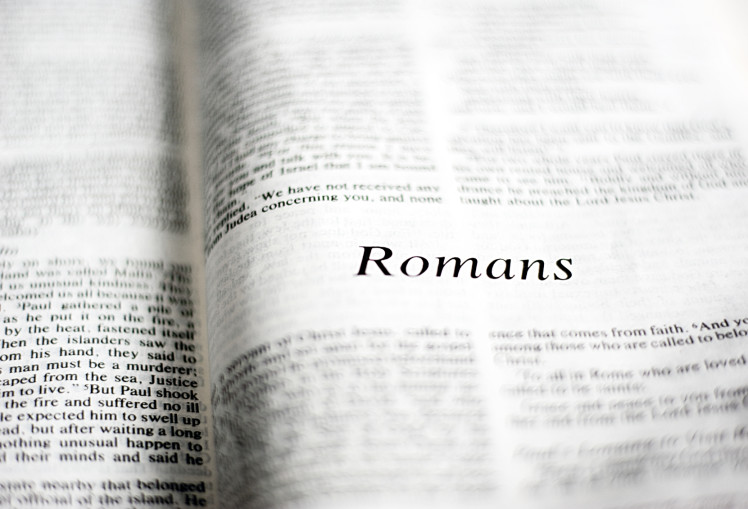Blog

Romans Bible Guide – Day Thirteen
February 27, 2016
Previously, in Romans: Paul has explained to the Romans that all of them who trust God – Jew or Gentile – are full members of the family of faith.
Romans 5:1-11
5 Therefore, since we are justified by faith, we have peace with God through our Lord Jesus Christ, 2 through whom we have obtained access to this grace in which we stand; and we boast in our hope of sharing the glory of God. 3 And not only that, but we also boast in our sufferings, knowing that suffering produces endurance, 4 and endurance produces character, and character produces hope, 5 and hope does not disappoint us, because God’s love has been poured into our hearts through the Holy Spirit that has been given to us.
6 For while we were still weak, at the right time Christ died for the ungodly. 7 Indeed, rarely will anyone die for a righteous person—though perhaps for a good person someone might actually dare to die. 8 But God proves his love for us in that while we still were sinners Christ died for us. 9 Much more surely then, now that we have been justified by his blood, will we be saved through him from the wrath of God. 10 For if while we were enemies, we were reconciled to God through the death of his Son, much more surely, having been reconciled, will we be saved by his life. 11 But more than that, we even boast in God through our Lord Jesus Christ, through whom we have now received reconciliation.

Points of Interest:
- ‘justified by faith’ – This one phrase serves as a summary for the first four chapters. Lots of missteps serve to separate us from God, self, and one another. We are made just – given standing with God and with one another – not through comparative status at another’s expense, but by trusting that through Jesus, God has made it so.
- ‘we have peace with God’ – The result of this new standing is peace with God. Scholars debate whether this phrase should be translated as, “we have peace,” or “let us have peace.” Either way, within reach, to be experienced is access to a free and easy relationship with God. For Romans whose gods demanded much from them and offered little, peace with the divine and access to God’s kindness would have sounded extraordinary.More than personal well-being, this phrase “peace with God through our Lord” had deliberate political overtones. Rome promised the Pax Romana – the peace and order and justice of Rome – through the rule of its emperor, called Lord and Savior. Paul elevates Jesus above Cesar and claims he provides a higher, deeper peace, with broader access as well.
- ‘ we boast in our hope… we boast in our sufferings’ – Of everything Paul had to say in this letter, this might have been the most ludicrous-sounding to the Romans. Romans would boast in the superiority of their state, and all the benefits it provided. Jews would boast in the superiority of their god and the privileged status their identity as God’s chosen conferred. By contrast, anyone suffering would lose opportunity to boast and would face shame, both internalized and reinforced socially by everyone who knew. Paul flips this reality on its head, saying that for the one who trust Jesus, good things are coming. Regardless of present circumstances, we will eventually share in the status and power and joy and goodness of God.The Orthodox say, “God became like us, so we could become like him.” If that is so, then that is a future worth being excited about.
- ‘hope does not disappoint us, because God’s love…’ – Literally, disappoint here is “put us to shame.” Sticking with the honor/shame language of his culture, Paul says God accepts and loves us, and that is our reality to experience by the Holy Spirit. Robert Jewett writes, “Thus the link between trauma and shame is broken by unconditional acceptance…. In Christ, traumatic adversity has lost its power to shame.”
- ‘…has been poured into our hearts’ – This language of “poured out” has pretty rich associations in the Bible. Jesus’ love is “poured out” for us in his death, symbolized by the wine that is poured at communion and the woman who poured out her perfume to anoint Jesus before his death. The Holy Spirit is also poured out on all flesh, Joel prophesies, and Peter in the book of Acts says is fulfilled amongst the followers of Jesus. The result of all this pouring out is God pouring love into us, regardless of our present circumstances.
- ‘while we were still sinners Christ died for us’ – If we need a proof of this love of God, this is it. While we had nothing to offer, when we were in fact missing the mark, not like God, even resistant to Jesus, he died for us. This might have been literally true for Paul’s readers, who had strong ties to either the Roman or Jewish authorities who conspired to kill Jesus. Paul implies it is symbolically true for all people, though, that Jesus died for us in love when we had nothing to offer him.
- ‘justified… reconciled… saved by his life’ – The second paragraph here is full of benefits that Jesus’ death and post-resurrection life ensure for those that trust him. There’s justification, this new standing before God and others. There’s the exalted future with God, called sharing in God’s glory. There’s salvation – rescue from a terrible fate, which Romans understood as being a barbarian outside the empire, but Paul understood as facing the terrible consequences and judgment that our sin provokes. Perhaps most powerful to a 21st century ear, though, is the final benefit here – reconciliation. Separated from God and alone in the world, Jesus gives his followers the opportunity to be reconnected with God as a child or friend.
Taking It Home:
For you – Consider any disappointments or suffering that have caused you shame. Invite God to pour out his love into your heart in this space. What does it mean to you that you can trust God to share in his glory?
For your church/city – Various groups of people in my city come to mind, when I think of folks struggling with shame and disappointment. I think of the dashing of American dreams experienced by some immigrants, or the struggles I’ve seen in friends in hospitals. Who comes to mind when you think of residents of your city who experience more shame and disappointment than hope and peace? Pray that God would reverse this inner state for them, and that our communities would do better by these people as well.

